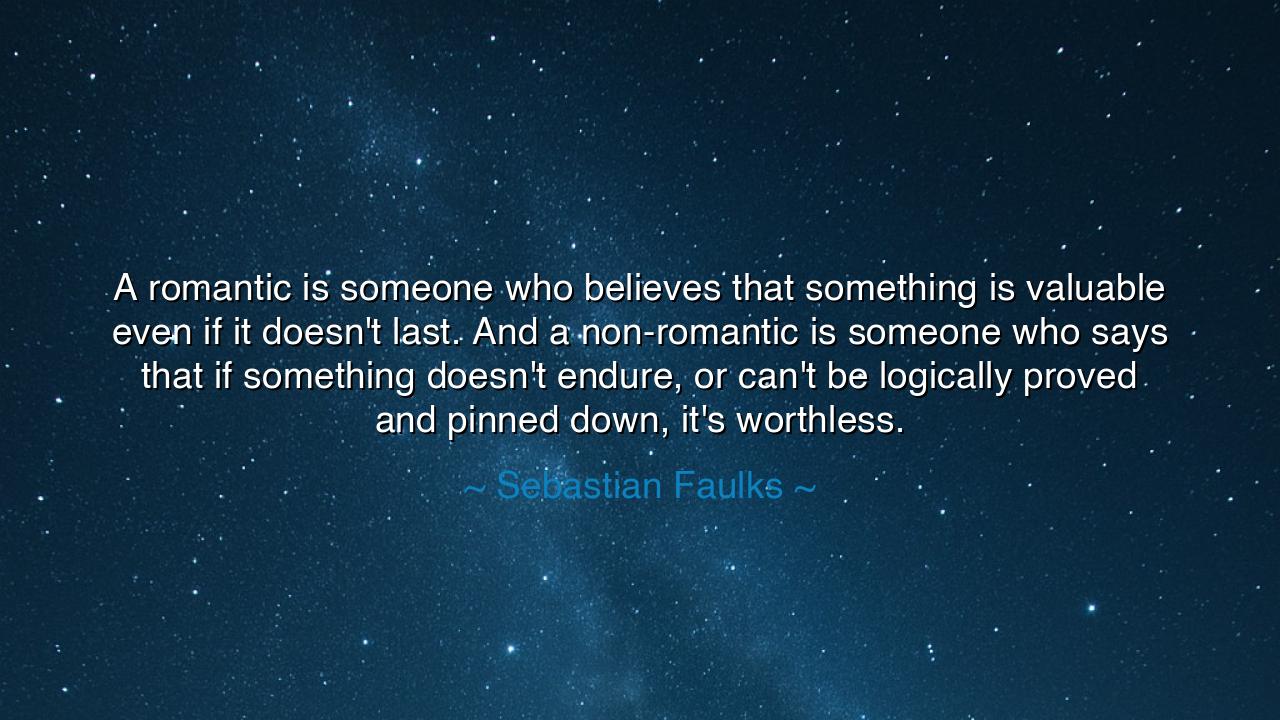
A romantic is someone who believes that something is valuable
A romantic is someone who believes that something is valuable even if it doesn't last. And a non-romantic is someone who says that if something doesn't endure, or can't be logically proved and pinned down, it's worthless.






The words of Sebastian Faulks—“A romantic is someone who believes that something is valuable even if it doesn’t last. And a non-romantic is someone who says that if something doesn’t endure, or can’t be logically proved and pinned down, it’s worthless”—shine like a torch in the darkness of pragmatism. They remind us that the soul of a romantic does not measure worth in years, permanence, or proofs, but in the intensity of the moment, in the beauty of experience, and in the flame that burns, however briefly, in the heart. For the romantic spirit, a fleeting sunset, a fragile flower, or a single kiss holds a sacredness beyond calculation.
The origin of this belief lies in the eternal clash between reason and passion. From the philosophers of Greece, who sought eternal forms, to the poets of the Romantic age, who exalted the fleeting and the ineffable, humanity has wrestled with this question: is value found in what endures, or in what moves us, even for an instant? Faulks takes his place among those who champion the latter, declaring that worth is not annulled by impermanence. Indeed, transience often sharpens beauty, making it rarer, more precious, like dew on morning grass that vanishes when the sun rises.
History gives us radiant examples. Think of the cherry blossoms of Japan—sakura—that bloom only for a handful of days each spring. Entire generations have celebrated their brief flowering, composing poems, hosting festivals, and finding in those fragile petals a symbol of life itself. Though the blossoms fall quickly, they are treasured all the more because they remind us of the brevity and fragility of existence. To the non-romantic, their passing might make them insignificant; but to the romantic, their very impermanence is what makes them priceless.
Consider also the life of John Keats, the English poet who died at twenty-five. His time was short, yet in that fleeting span he composed words that have endured for centuries. Keats himself spoke of life as “a vale of soul-making,” not measured by length, but by the richness of its beauty. Here again, Faulks’s words ring true: even if a thing does not endure, it can still be of immeasurable value. The measure of the romantic spirit is not the ledger of time, but the depth of meaning.
The lesson is this: do not dismiss what is temporary. A friendship that lasts a summer may shape you forever. A smile exchanged with a stranger may lift a weary heart more than years of routine companionship. The non-romantic will demand proofs, permanence, and guarantees; but the wise romantic knows that much of life’s holiness lies in its fleeting gifts. To reject them is to close the eyes to half the beauty of existence.
Practically, we must learn to embrace impermanence as a teacher rather than an enemy. Treasure the moment without demanding that it last forever. When love comes, cherish it without clinging. When beauty passes before you, honor it, even as it fades. Write the poem, take the walk, share the laughter, though you know it may not return. In doing so, you will learn to live not in fear of loss, but in gratitude for the gift of the present.
Thus, Faulks’s words are not only definition but exhortation: be a romantic, not because life guarantees permanence, but because its fragility makes it precious. To insist that only what endures has worth is to deny the very nature of existence, which is woven of beginnings and endings, of blooms and witherings, of moments that pass like whispers yet leave echoes in eternity.
So let this truth be handed down: the fleeting is not worthless—it is sacred. To love as a romantic is to embrace impermanence and still call it beautiful. For in the end, what matters most is not how long something lasted, but how deeply it touched the soul while it was here.






AAdministratorAdministrator
Welcome, honored guests. Please leave a comment, we will respond soon